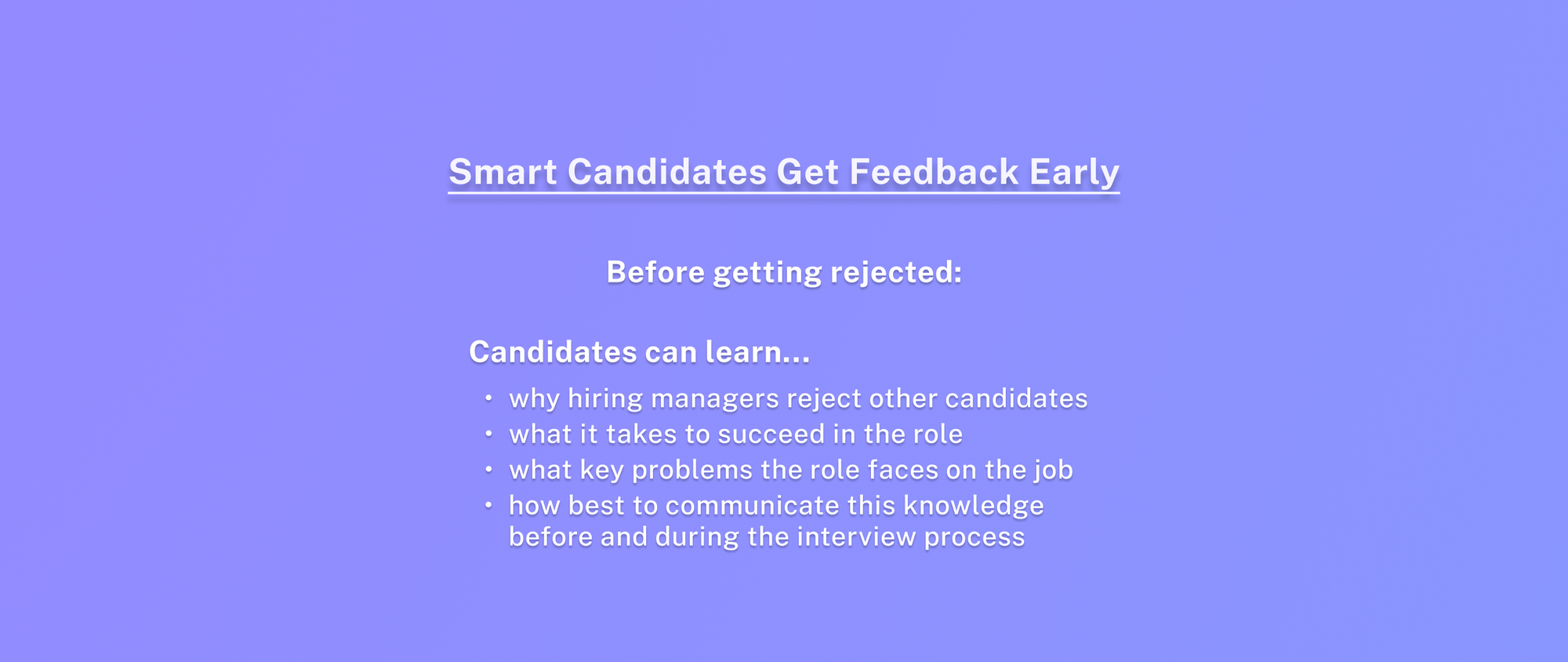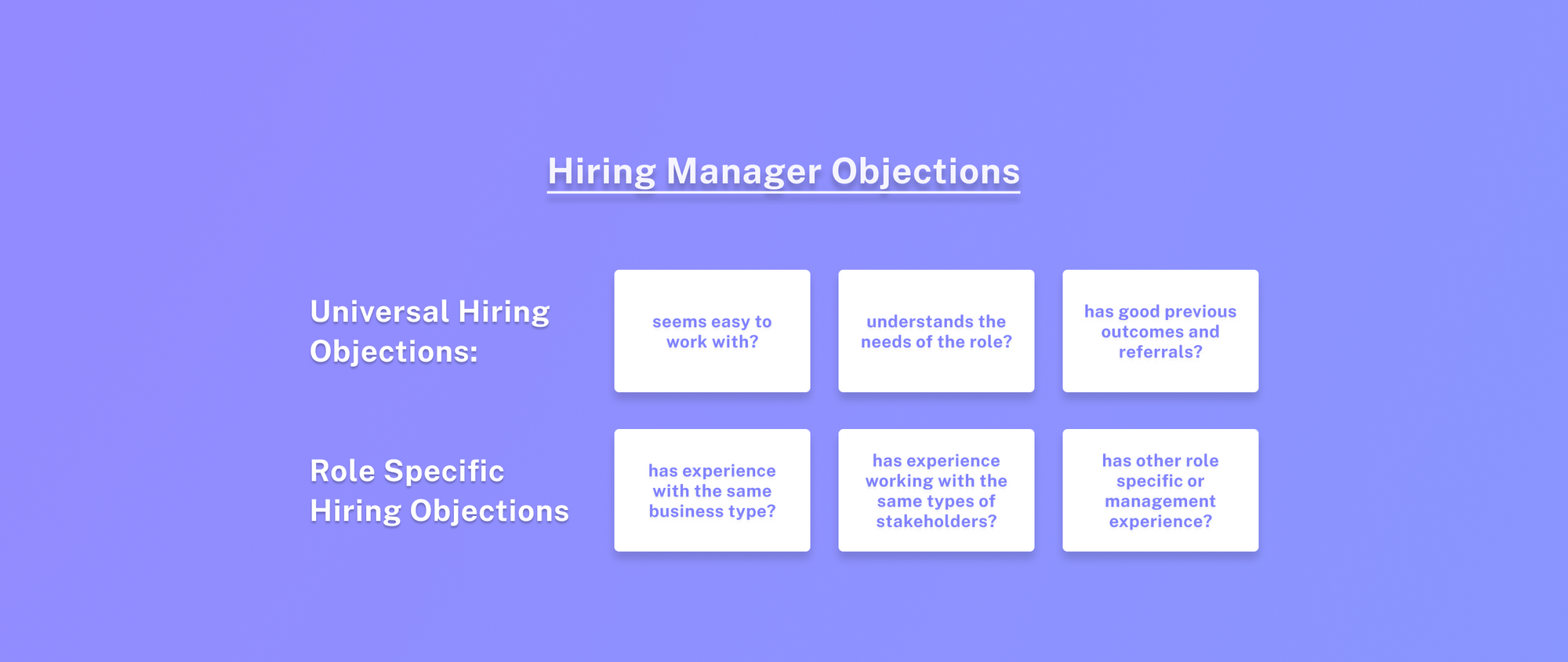Get Your Dream Job: The Ultimate Practical Step by Step Guide

Table of Contents
- The Standard Job Search is Broken
- The Better Way to Search for a Job
- Uncover Your Dream Job's Key Hiring Objections
- Address Key Hiring Objections and Land Your Dream Job
The Standard Job Search is Broken
- Most feedback candidates get from interviews and job applications is vague and unhelpful (applicants did/didn't get the interview; did/didn't get the job)
- candidates don't know how close they came to getting a job
(additional applications and interviews don't mean you're close to being hired) - resumes and interviews are not reliable or effective ways to sell yourself
(resumes easily get thrown away or ignored and interviews give you narrow windows of opportunity with high risk)
Unhelpful job search feedback
Candidates rarely get useful information about why they were rejected from jobs.
Why don't companies give job applicants more/better feedback?
Companies avoid giving job applicants feedback to alleviate themselves of liability.
What can job seekers do to get the feedback they need?
Once you've been rejected companies will be very unlikely to tell you why.
Candidates need to ask useful questions during and not after the interview process to figure out why they might get rejected and address them so they can get the job.
That means the smartest candidates focus on figuring out why other candidates get rejected well before any formal interviews take place.

Candidates don't know whether they're close or far from getting the job
Applying to more jobs doesn't necessarily bring you any closer to getting one.
Most candidates only know how far they are within each company's application process.
Most candidates don't know if they are close or far from getting a job.
Why does this problem exist?
Hiring managers often see hundreds of applicants for every new role they're hiring for. This gives them many perceived options of who they can hire.
Applying to jobs doesn't mean hiring managers consider you qualified for them.
What can job seekers do to measure their job search progress?
Candidates must measure success in their job search by the degree they've identified and addressed hiring managers' objections to getting the role they want.
Hiring managers have objections candidates must uncover and address before they can be hired for their target position. The key to job search success is to continuously learn more about these objections so candidates can improve how they sell themselves at each next opportunity they encounter.
To get the job you want, your task is to figure out why managers wouldn't hire you and address these objections before you get rejected from getting the job.

Resumes and interviews are not reliable and effective ways to sell yourself
Resumes convey an incomplete picture of what you've done in the past and why you're qualified to succeed in the job now.
Interviews are hit or miss. How you're perceived in interviews depends on external factors such as how interviewers feel and what else they have going on that day.
Your interview performance varies for that same reason as well.
What can job seekers do to address this problem?
Hiring managers need to know that candidates will succeed in the role they hire them for, ideally as soon as they start.
It's your job as a job-seeker to do everything in your power to prevent yourself from being rejected from the opportunities you want.
Convey you're ready to succeed on the job by showcasing how well you understand the role and how to succeed within it.
The Better Way to Search for a Job
- Identify target roles and/or target companies
- Identify stakeholders involved in the hiring decision
- Identify key hiring objections of primary stakeholders
- Address the hiring objections of the primary stakeholders
How to Uncover Your Dream Job's Key Hiring Objections
- Find the roles you want to be hired for
- Find people who work in or manage these roles
- Find ways to reach these people informally
social media (twitter, instagram, etc)
email
linkedin
meetups
social gatherings
- Make contact comfortably
don't say you're looking for a job
don't ask for an interview or follow-up meeting
don't ask for a time commitment
don't weigh in on controversy or give advice
- Map out the important high-level questions you'll need to address to get hired
who are the key stakeholders you'd be working with?
what are key pain points these stakeholders experience on the job?
how can you communicate your understanding of these pain points?
what other context/knowledge do you need to show to stakeholders?
how do people effectively communicate this context/knowledge?
- Ask the informal questions that you need answers to
what does it take to succeed as a [job-title]?
what's a common reason people fail as a [job-title]?
what's does a [job-title] do that affects everybody else?
what's the most stressful time of the year for [job-title]s?
who do [job-title] work most closely with?
what's [job-title] biggest concern working together?
what do managers of [job-title] typically worry about?
what do people expect from a [job-title] during the first 90 days?
- Ask for the most comfortable form of contact
email
social media (twitter, instagram, telegram, WhatsApp, etc)
linkedin
text
- Followup informally within 24 hrs
start the conversation with a short casual message
followup on something they said and a simple action you took
ask a question about the job they can easily answer, but that helps you validate how to sell yourself and lets you continue the conversation
followup quickly to their replies
keep your replies short and meaningful
Address Key Hiring Objections and Land Your Dream Job
Convey You're Ready to Succeed on the Job
- Identify the job you’re looking to be hired for.
- Identify a core problem you'd be responsible for solving.
- Label the problem as the people who would hire you would describe the problem themselves.
- Describe why the problem's important.
- Describe what risks are involved in implementing a solution and what considerations must be made to preserve success from prior work and existing stakeholder relationships.
- Craft a narrative around the problem you'd be solving that would be easy for your target audience of hiring managers to relate to.
- Describe how you would solve the problem using an example that's applicable to the situation.
- Publish this content where you expect hiring managers will see it before deciding to interview you and/or making a hiring decision.